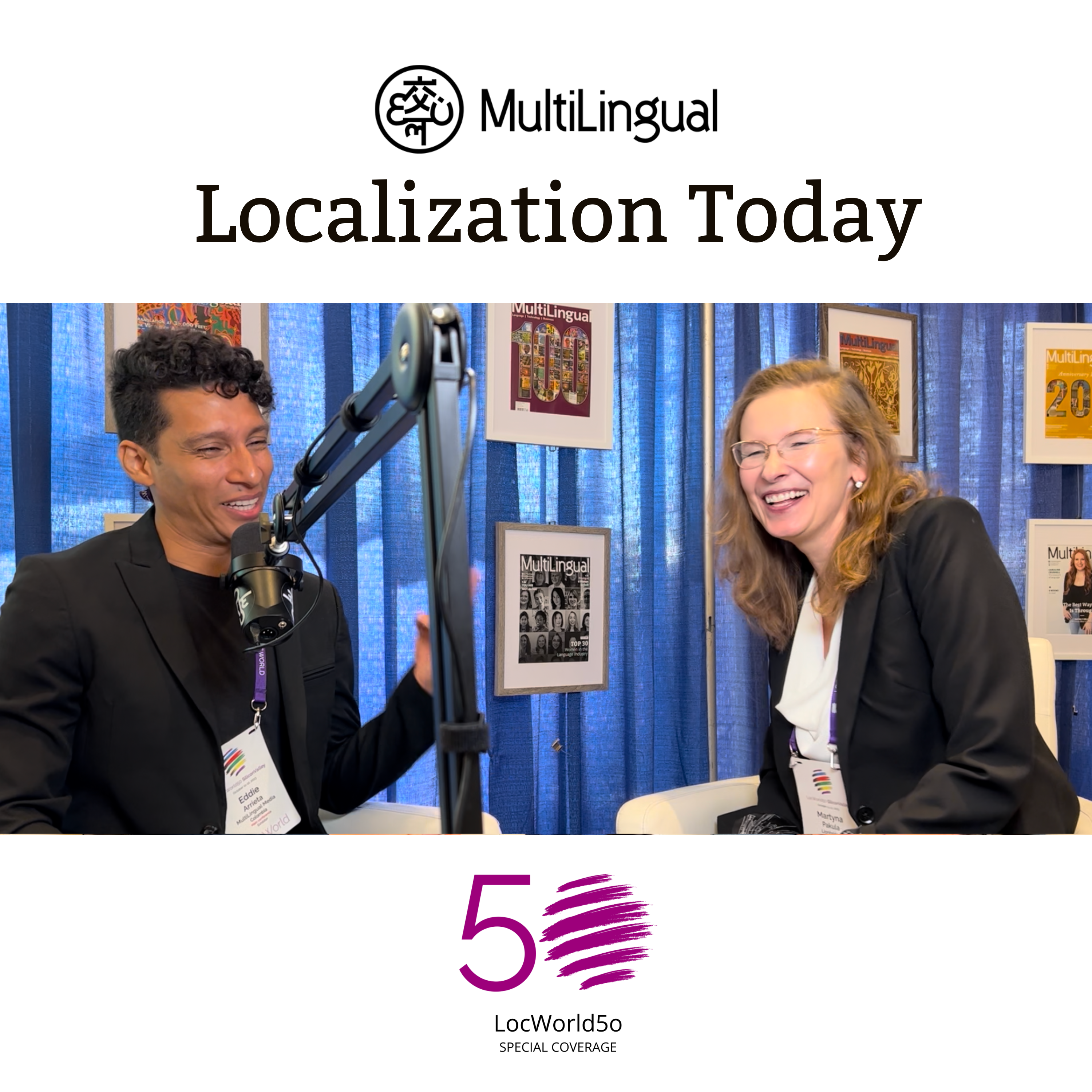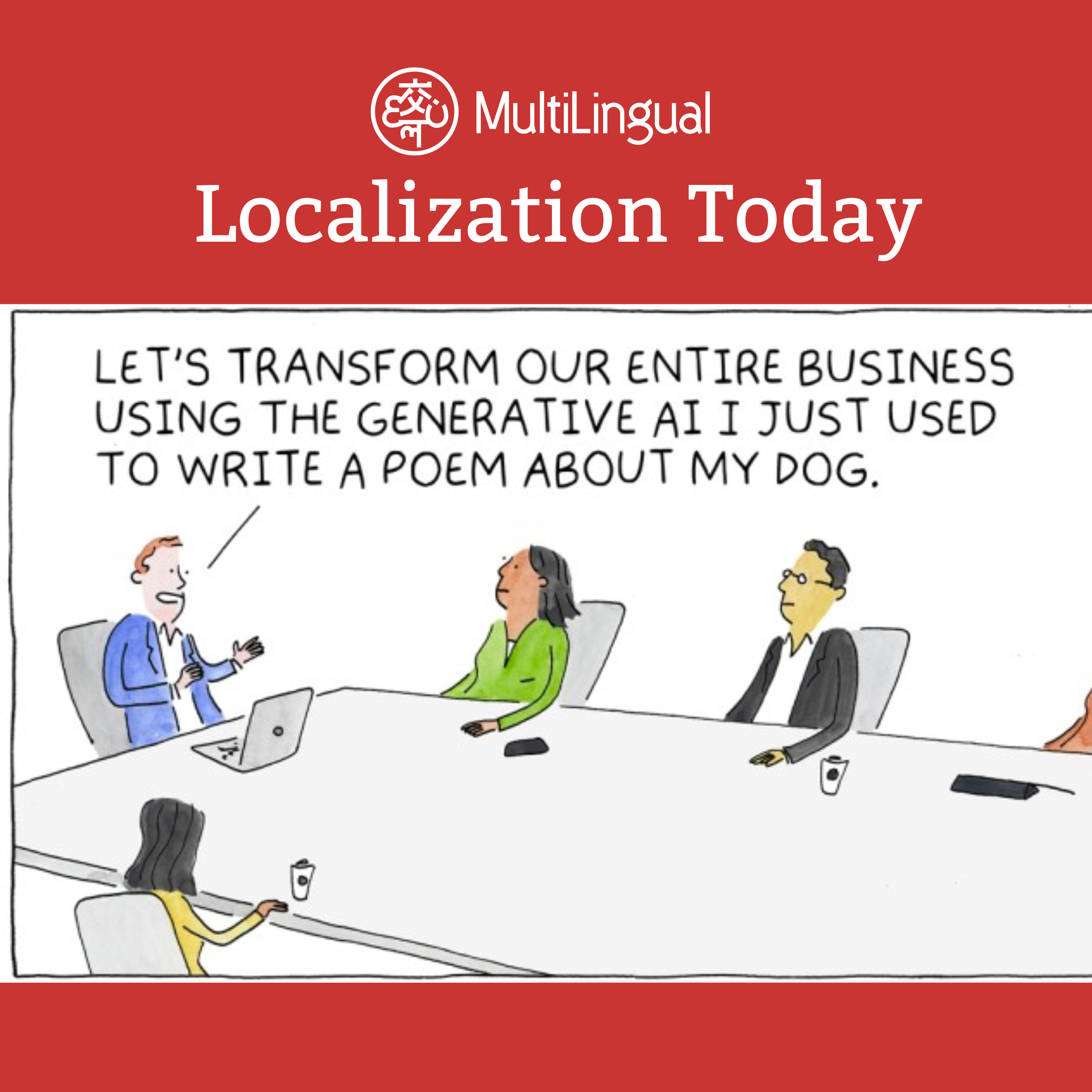Episode Transcript
[00:00:06] Speaker A: This is localization Today, a podcast from multilingual media covering the most relevant daily news in the language industry.
[00:00:16] Speaker B: How climate conscious is the language industry.
[00:00:19] Speaker C: By Alison FErc Earth Day, established in.
[00:00:24] Speaker B: 1970 and celebrated every year on April 22, aims to mobilize people around the world to protect the planet by safeguarding the environment.
[00:00:34] Speaker C: Its apt, then, that the April issue.
[00:00:37] Speaker D: Of multilingual magazine should address this topic through the lens of the language industry.
[00:00:42] Speaker E: Late last year, Mike Klinger of language.
[00:00:45] Speaker D: Transactions raised the sustainability topic with several.
[00:00:48] Speaker B: Language industry organizations and gently nudged us into taking action.
Mike was motivated by a docuseries on climate change that explored how we can.
[00:00:59] Speaker D: Have a positive impact on the environment.
[00:01:01] Speaker E: In different areas of our lives, including at work. Because the average person will spend around.
[00:01:07] Speaker D: 90,000 hours at work over a lifetime.
[00:01:10] Speaker B: Its easy to understand how habits and behaviors in that arena can make a difference. Weve all seen advice about ways to.
[00:01:18] Speaker E: Alter our environmental impact, reevaluate how much we drive and fly, conserve water, use renewable energy, reuse and recycle. But how many of us apply this advice at work?
[00:01:31] Speaker B: And how many companies prioritize sustainability at all?
[00:01:36] Speaker D: Those questions were our starting point when.
[00:01:39] Speaker B: Representatives of five language industry organizations, language transactions, CSA research, the Globalization and Localization.
[00:01:48] Speaker E: Association Gala, the Association of Language Companies, and multilingual media got together to discuss.
[00:01:56] Speaker B: Sustainability in our sector.
[00:01:59] Speaker E: Our goal was to assess industry attitudes.
[00:02:01] Speaker B: And behaviors related to sustainability at work.
Why prioritize sustainability in business?
While sustainability may seem like a curious.
[00:02:11] Speaker D: Topic for localization professionals who are understandably.
[00:02:15] Speaker E: Focused on near term challenges, it can't be relegated to the personal sphere only.
[00:02:21] Speaker B: That's because the evidence for rapid climate.
[00:02:23] Speaker E: Change is compelling and necessitates a collective.
[00:02:26] Speaker B: Effort to combat the crisis on a global scale.
[00:02:30] Speaker E: Temperatures are rising, the ocean is getting warmer, and more acidic species are disappearing.
[00:02:36] Speaker B: And extreme weather events are increasing each year in frequency and intensity.
[00:02:41] Speaker D: The good news is that embracing sustainability.
[00:02:44] Speaker B: Is the right thing to do, not.
[00:02:45] Speaker E: Only for Mother Earth, but also for businesses.
[00:02:49] Speaker B: The United nations defines sustainability as meeting the needs of the present without compromising the ability of future generations to meet their own needs. It doesnt mean sacrificing profits or focus.
[00:03:02] Speaker E: And it can be a competitive advantage with a positive impact on the bottom line. Improving resource efficiency, lowering operating costs, enhancing.
[00:03:12] Speaker B: Brand reputation, and attracting environmentally conscious clients.
[00:03:16] Speaker E: Like millennials, genzas, and regulated industries are.
[00:03:20] Speaker B: All solid business incentives to build sustainability.
[00:03:23] Speaker E: Into your corporate strategy.
[00:03:26] Speaker C: Climate change and Sustainability Survey our coalition.
[00:03:30] Speaker D: Of language industry organizations developed a survey to find out how climate conscious the.
[00:03:35] Speaker E: Language industry is as a whole.
[00:03:37] Speaker C: The survey opened on March 6 and.
[00:03:40] Speaker B: At press time had 115 verified responses.
[00:03:44] Speaker D: From respondents in 29 countries.
[00:03:47] Speaker B: Since the survey was distributed and promoted.
[00:03:50] Speaker E: Through our organizations channels, we know that.
[00:03:53] Speaker B: Most respondents come from the localization sector.
[00:03:56] Speaker E: Which tends to have professionals that are well educated and globally minded. For this article we present only preliminary results.
[00:04:05] Speaker B: The survey will remain open through April.
[00:04:08] Speaker E: So if you havent taken it yet you still can.
[00:04:11] Speaker B: We will continue collecting responses and updating.
[00:04:14] Speaker E: Our findings as the sample size gradually increases.
[00:04:18] Speaker B: With the sample at its current size, its too soon to draw reliable conclusions based on our demographic segments.
[00:04:25] Speaker E: As more people respond well, update this analysis to break out the data by.
[00:04:30] Speaker C: Company type and other attributes.
[00:04:33] Speaker E: For now we can see some clear themes emerge.
Some percentages may not add up to.
[00:04:40] Speaker C: Exactly 100% due to rounding awareness, interest.
[00:04:45] Speaker E: And concern is high.
Happily, awareness of the impacts of climate change among our respondents is high, with.
[00:04:53] Speaker B: 95% reporting that they are very aware.
[00:04:56] Speaker E: 58% or aware 37%.
[00:04:59] Speaker B: Just 3% report being very unaware of the effect of humans on the climate.
[00:05:04] Speaker C: The counterpart to this question, which measures.
[00:05:07] Speaker B: A respondents interest in and concern about climate change, shows an encouraging 94% being.
[00:05:13] Speaker E: Either very interested 52% or interested 42%.
[00:05:19] Speaker B: Just one respondent was not at all.
[00:05:21] Speaker C: Interested, but few think theyre doing enough.
[00:05:25] Speaker B: 83% of respondents feel they are not doing enough to lessen climate change.
[00:05:30] Speaker E: The complement to this question asks respondents.
[00:05:33] Speaker D: To rate their personal actions around sustainability.
[00:05:37] Speaker B: 69% rate themselves as either very active.
[00:05:40] Speaker E: 14% or active 55%. The most common actions include recycling, using public transit or working from home, using.
[00:05:50] Speaker C: Solar power, and reducing consumption right in.
[00:05:54] Speaker E: Responses are plentiful and varied, and other.
[00:05:57] Speaker B: Notable actions include reducing international travel, voting.
[00:06:01] Speaker E: For politicians who support the environment, and eating less meat.
[00:06:05] Speaker C: Employer actions are rated as neutral when.
[00:06:09] Speaker B: Asked about their employers level of interest.
[00:06:11] Speaker E: In or concern with climate change or their clients interest or concern for respondents.
[00:06:16] Speaker B: Who identified themselves as freelancers.
[00:06:19] Speaker E: Notably, many respondents were neutral, 34% selected neither not interested or interested. When asked whether their employer or clients have an environmental social governance plan, 45% said yes, 21% said no, and 34% said don't no. Beliefs about customer perceptions are mixed.
[00:06:44] Speaker B: How important do you think your employers attitudes and practices around sustainability are to customers?
[00:06:51] Speaker E: 40% say it's important, 18% say it's.
[00:06:54] Speaker B: Very important, and 31% say their customers.
[00:06:58] Speaker E: Are ambivalent about it. Only 10% report it being unimportant.
[00:07:03] Speaker B: This matches what we have read in publicly available large sample market research indicating.
[00:07:08] Speaker E: That global consumers, especially those in younger generations, consider a company's sustainability efforts and.
[00:07:15] Speaker B: Reputation when making purchasing decisions. We also asked respondents to consider how.
[00:07:21] Speaker D: They would describe their companys actions around.
[00:07:24] Speaker E: Sustainability 49% 49% rate their employers as active 46% Orvery 3% only 11% rate them as not active 8% or not at all active 3% and neutrality once.
[00:07:41] Speaker B: Again takes a significant piece of the pie at 39%.
[00:07:45] Speaker C: Businesses share responsibility the survey asks who.
[00:07:50] Speaker B: Ultimately has responsibility for sustainability and climate change mitigation efforts.
Respondents could choose governments and legislative bodies.
[00:07:59] Speaker C: Businesses, individuals, or any combination thereof.
[00:08:04] Speaker B: Most respondents believe responsibility should be shared.
[00:08:07] Speaker D: No matter the combination.
[00:08:09] Speaker B: Our language sector sample expects businesses to.
[00:08:12] Speaker D: Play a role in tackling climate change.
[00:08:14] Speaker E: Challenges and to take a leading role in sustainability efforts. We saw a clear consensus when we.
[00:08:20] Speaker D: Asked how important it is for the.
[00:08:22] Speaker E: Localization industry to prioritize sustainability 78% believe.
[00:08:28] Speaker B: Its very important 29% or important.
[00:08:33] Speaker C: Only.
[00:08:34] Speaker B: 7% believe its not important 5% or.
[00:08:37] Speaker E: Not at all important 2% 16% sit in the neutral zone, choosing neither unimportant.
[00:08:44] Speaker C: Nor important conclusions the data, while still.
[00:08:49] Speaker E: A work in progress, show that the language industry is highly aware, very concerned.
[00:08:55] Speaker B: And active when it comes to climate change and sustainability practices.
[00:08:59] Speaker C: This is good news.
[00:09:01] Speaker E: From our initial review of data by.
[00:09:03] Speaker C: Company type, we see that privately held.
[00:09:06] Speaker D: Companies can learn something from publicly traded.
[00:09:08] Speaker C: Companies who appear to be further down.
[00:09:11] Speaker B: The road with sustainability initiatives.
[00:09:14] Speaker D: The same is true for smaller companies.
[00:09:16] Speaker C: Learning from larger ones.
[00:09:18] Speaker B: Another major theme that emerges is neutrality, which we would argue is synonymous with.
[00:09:24] Speaker D: Either a narrow view of social responsibility.
[00:09:27] Speaker E: It isnt the business of businesses to.
[00:09:29] Speaker B: Be concerned with climate or complacency in this arena. If youre not part of the solution.
[00:09:34] Speaker E: Youre part of the problem.
As advocates of more action, we can.
[00:09:39] Speaker B: Hope that this figure will change as.
[00:09:41] Speaker E: We get more responses to this survey.
[00:09:44] Speaker C: Yet there is plenty to be optimistic about and much to be proud of.
[00:09:49] Speaker B: Many individuals and businesses are making plans, taking action, and recognizing the importance of.
[00:09:55] Speaker C: Hashlock sustainability call to action many people.
[00:10:00] Speaker B: Agree that climate change is the defining crisis of our lifetime.
[00:10:05] Speaker E: It stands to reason that any efforts.
[00:10:07] Speaker B: We make to mitigate its effects should.
[00:10:09] Speaker E: Extend to work where we spend vast amounts of time. So let this be your wake up.
[00:10:15] Speaker D: Call if you haven't yet begun thinking.
[00:10:17] Speaker E: About sustainability at work, and if you have, let this be your invitation to.
[00:10:22] Speaker B: Share your know how and experiences with others.
[00:10:25] Speaker C: Up next, our small, scrappy quasi consortium.
[00:10:30] Speaker D: Will be looking for ways that our.
[00:10:31] Speaker B: Organizations can address the gap between knowing.
[00:10:34] Speaker C: And doing well, share success stories and.
[00:10:37] Speaker B: Explore strategies and tactics for turning sustainability intentions into actions. Well spot light companies doing great things.
[00:10:46] Speaker C: In this area and well keep the.
[00:10:48] Speaker E: Topic on the industrys collective radar. In the meantime, we encourage you to do some exploring of your own. Here are a few ideas to get.
[00:10:58] Speaker B: Develop an ESG plan for your company.
[00:11:00] Speaker E: Or organization measure, track, and reduce your company's environmental impact.
[00:11:07] Speaker B: Remember that the extensive computational infrastructure required for translation services consumes vast amounts of energy. Advocate for change at your organization.
[00:11:18] Speaker E: Educate and inform from within.
[00:11:20] Speaker B: Partner with non profits making a difference.
[00:11:23] Speaker E: Encourage or allow remote work. If you don't already, please let us.
[00:11:28] Speaker D: Know what our organizations can do to.
[00:11:30] Speaker E: Help you on this journey.
This article was written by Alison Ferc, executive director of Gala, where she leads.
[00:11:39] Speaker B: Internal operations and is responsible for executing.
[00:11:43] Speaker D: And expanding programs and services to members.
[00:11:48] Speaker E: Originally published in multilingual magazine, issue 226, March 20, 2024.
[00:11:56] Speaker A: Thank you for listening to localization today. To subscribe to multilingual magazine, go to multilingual.com.
Subscribe.


